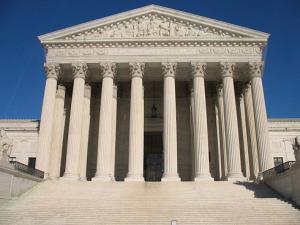Immigration4-4 Supreme Court tie keeps Obama's sweeping immigration reforms blocked
A 4:4 tie at the Supreme Court has dealt Barack Obama’s immigration program – and his legacy — a major setback. The president took his executive action to shield about four millions of undocumented immigrants from deportation after House Republicans refused to bring to the floor for a vote a 2013 bipartisan Senate legislation which provided a path to citizenship for illegal immigrants. Twenty-six states with Republican governors challenged Obama’s executive action, arguing that Obama had exceeded his authority by granting a blanket deportation deferment to millions of undocumented immigrants. A federal judge in Texas ruled in favor of the twenty-six governors, and the U.S. 5th Circuit Court of appeals upheld that Texas court’s decision last November.

U.S. Supreme Court // Source: commons.wikimedia.org
A 4:4 tie at the Supreme Court has dealt Barack Obama’s immigration program – and his legacy — a major setback.
In April the court had heard arguments about whether to revive Obama’s plan to delay deportation for about four million undocumented immigrants who met certain criteria. These criteria include coming to the United States as children, living in the United States at least since 2010, having no criminal record, and having children who are U.S. citizens or lawful permanent residents.
The president issued his executive order after House Republicans refused to bring to the floor for a vote a 2013 bipartisan Senate legislation which provided a path to citizenship for illegal immigrants.
Twenty-six states with Republican governors challenged Obama’s executive action, arguing that Obama had exceeded his authority by granting a blanket deportation deferment to millions of undocumented immigrants. They argued that the president’s argument that his action amounts to nothing more than common prosecutorial discretion was wrong, because such discretion should be applied on a case-by-case basis, not to an entire category of potential law-breakers.
A federal judge in Texas ruled in favor of the twenty-six governors, and the U.S. 5th Circuit Court of appeals upheld that Texas court’s decision last November.
A panel of the 5th Circuit said the program was “much more than non-enforcement” and that the change in designation for the immigrants would trigger eligibility for federal and state benefits that would not otherwise be available.
The Washington Post reports that the supreme court’s 90-minute hearing in April considered the argument over the recent expansion of Deferred Action for Childhood Arrivals (DACA) and the creation of Deferred Action for Parents of Americans and Lawful Permanent Residents (DAPA).
The court stressed the importance of a two-word phrase the administration used to describe the status of immigrants under the programs: lawful presence. The states argued that Obama’s action gives the undocumented immigrants more rights than federal law allows.
Scott Keller, the solicitor general of Texas, argued in April that DAPA is an unprecedented unlawful assertion of executive power and one of the biggest changes in immigration policy in American history.
He also raised concerns that deferred action opens the way for immigrants to gain authorization to work, eligibility for benefits, and obtain driver’s licenses with the financial burden which accrue to states such as Texas.
Donald Verrilli, the government’s solicitor general, claimed the president has the authority to set priorities for immigration enforcement. But Justice Anthony Kennedy challenged Verrilli’s assertion, saying that it was not clear that the president can defer deportations for millions of people without congressional authorization, saying “that is a legislative task, not an executive task.”
He added: “It’s as if the president is defining the policy and the Congress is executing it. That’s just upside down.”
“Today’s decision keeps in place what we have maintained from the very start: one person, even a president, cannot unilaterally change the law,” Ken Paxton, the Texas attorney general, said in a statement after the ruling. “This is a major setback to President Obama’s attempts to expand executive power, and a victory for those who believe in the separation of powers and the rule of law.”
In a brief statement from the White House, President Obama said the ruling is a deep disappointment for the millions of immigrants who will not be able to emerge from the threat of deportation for at least the balance of his term.
“Today’s decision is frustrating to those who seek to grow our economy and bring a rationality to our immigration system,” he told reporters. “It is heartbreaking for the millions of immigrants who have made their lives here.”
He also predicted that lawmakers will eventually act to overhaul the nation’s immigration system.
“Congress is not going to be able to ignore America forever. It’s not a matter of if, it’s a matter of when,” he said. “We get these spasms of politics around immigration and fear-mongering, and then our traditions and our history and our better impulses kick in.”
